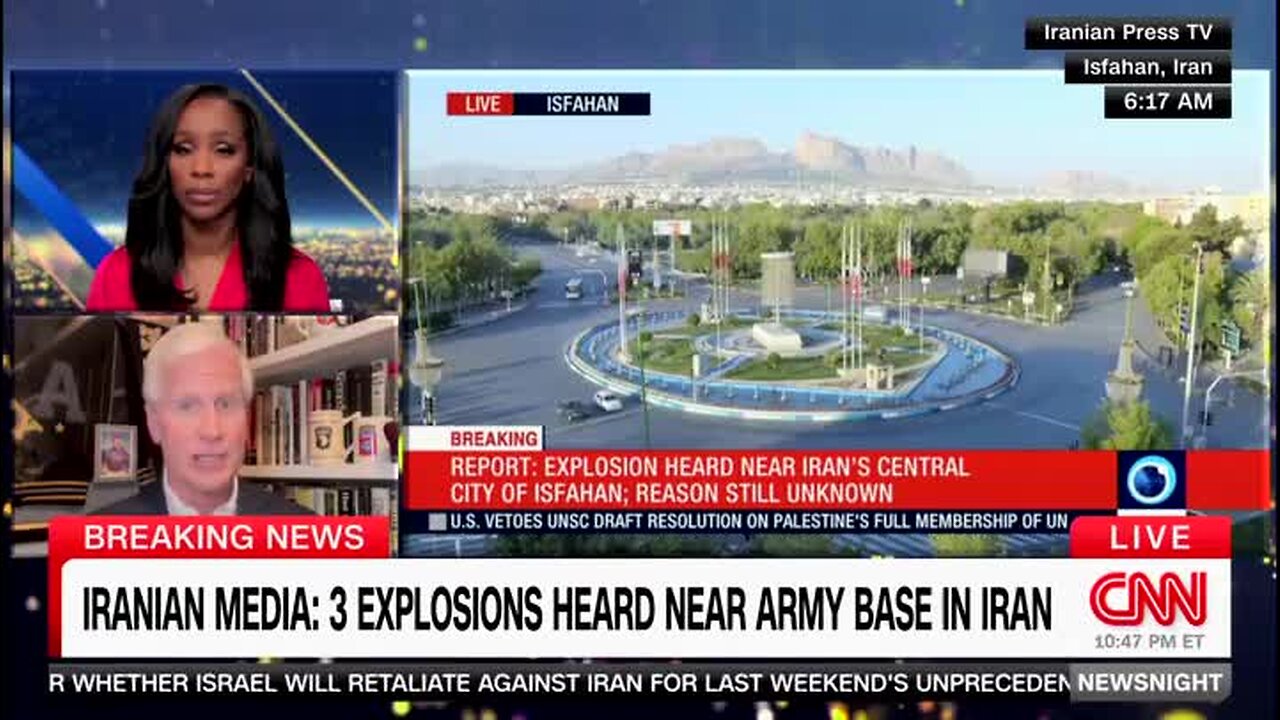Premium Only Content

CNN: Israel Confirms Missile Attack Against Iran
RUSH TRANSCRIPT:
Spider marks standby again for us, we‘re going to go back to Alex Marquardt with some breaking news outlets yeah.
>> Confirmation from a us official that is Israel has indeed struck Iran tonight, that what we are seeing this explosion or explosions around the city of isfahan is indeed an Israeli attack against Iran. This is the retaliation that we have thought me becoming for several days now, ever since Iran carried out that strike last weekend against Israel with those more than 300 drones ballistic missiles, and cruise missiles, there are not too many details about the dimensions, the breadth of the Israeli strike tonight, but a us official confirming to me just moments ago that what we are seeing is indeed Israel carrying out a strike against Iran. What we‘ve been seeing from local reports now, multiple Iranian reports official jill in semi official, is explosions near the city of khan, which is in central western central Iran. One more thing that the official told me is that it is not believed to be against a nuclear facility. We‘ve been talking about the city of khan is one of Ron‘s most important there is a significant nuclear facility there. My understanding from speaking with now multiple us officials is that the targets that Israel had indicated that they would be going after in a counter strike, would not be nuclear. One senior us official also telling me that the targets would not be civilian as we were just saying moments ago, Abby, the us was expecting Israel to carry out a strike that was limited in scope perhaps against military targets. But something that would be visible so as to tell the world this is Israel hitting back against Iran. Of course, we‘ve seen these images now for over the past hour, this is a very visible strike. And now we have this confirmation that this was indeed Israel that is attacking Iran. So major questions now where we go from here, we have to get a much better sense. Indeed, Israel and the us have to have a much better sense of what was struck, what the damage was done in order to be able to try to predict how Iran might respond. But we have gotten some some very serious words from a whole range of Iranian officials over the course of the past few days, the latest of whom was this Iranian foreign minister in New York with our colleague Erin Burnett tonight, a warning that if Israel were to attack Iran on, that, they would strike back. There would strike back hard, that they would expand their range of targets beyond just military like last weekend to include civilian financial and others, and that they could do so immediately. One thing to note from the foreign ministers interview, he said that they would not be going after us targets us the us were somehow directly involved I was told very firmly by a us official not too long ago that the us certainly did not give the green light to this Israeli operation. What we have heard all week long from senior administration official scholz is that they did not want Israel to carry out this counter attack. They wanted to take the win, so to speak. And essentially, let last week agains defense that formidable defense of Israel, taking down 99% of what was fired at it essentially speak for itself as not to expand this conflict, Abby and that‘s certainly did not happen, Alex, thank you for bringing us back right. Reporting continued to stand by for us and we‘ll get back to you as soon. And as you have more, I want to go to director at James Clapper just to react there to what you heard Alex report, this has been confirmed by us official teube, Israeli strike against Iran, but not an attack against nuclear facilities that we know are in that area perhaps military facilities that are also in that area. What do you make of it?
>> To mind here, Abby, for me, is all of our analyses or perhaps more accurately are speculation seems to be premised on the assumption that both protagonists here, that is Israel and Iran are attacking each other in the hopes of messaging each other. And then somehow these attacks are circumscribed and limited to convey a message. I think we‘re right capitally based on the information that Alex just discuss that looks like there was an attack. I think we‘re rapidly growing out of that phase.& that the escalation ladder is going to get harder and harder to control and the messaging phase is perhaps over. I take the uranian officials, notably the foreign minister at their word and I don‘t think they‘re going to respond in kind. But they‘re going to respond with a larger attack that in their minds would be more effective than the first one.
>> There. And I think that you may be right. We‘ve been discussing. It‘s not clear that either side knows how this might end director Clapper continue to stand by for us. Major Mike Lyons is with us as well. Major lions. Your reaction to the fact, according to Alex the sources that there were non nuclear targets who that may have been the receiving end of Israeli bombs here in the region well, they had to be followed up with intel and they had to be important targets.
>> Said in for why they tacked them. Well, what was their reasoning behind them? Again, it‘s just too close to that facility. In order to think that they wouldn‘t have to send a signal that they could go and get it. But air defense platforms, there‘s other difference platforms I could have attacked along that border. They could have been Republican garden force, they could‘ve been other military units that the Israelis thought was high-value targets and it‘s an opportunity to go after them, but didn‘t get in most cases, they would have to take out multiple air defense platforms along the way along that axis of attack. If they‘re especially going to put their own pilots in harm‘s way in order to conduct this kind of attack. So we have to say we will get more information, but from my perspective, the why I think comes back to a warning to Iran on that they‘ll go after their nuclear facilities.
>> Standby again, joining me now is Robin Wright. She‘s a fellow at the us institute for peace. Robin you know, this region, the conflicts here the risk, as you heard, director Clapper say, of the escalation ladder being climbed up so rapidly that the both parties cannot come down from it. What do you think are the consequences of that well, he‘s really clearly trying to demonstrate its military superiority and it has done that effectively, whether it‘s in damascus are now in Iran, if especially if it‘s close to a nuclear facility, it may and not take it out, but it is showing what it‘s muscle is the big question, of course, is what Iran does and we have to remember that it use only a small fraction of its arsenal.
>> 000 ballistic missiles and so it used somewhere around 10%. it has a lot of weaponry that it can on leash, on Israel. Now, the tragedy and all of this is, I don‘t think either Israel or Iran wants the beaver war clearly the United States has used its leverage to try to prevent the region from deteriorating into something that is no one can contain. One of the big questions of course, is also what is Israel‘s long-term strategy isn‘t seeking to prevent a nuclear weapon of capability or is it trying to encourage or do things that lead? Eventually to some kind of regime change. And I think Israel has proven. Its short-term effectiveness in taking out Iranian or Iranian proxy assets. It‘s weapons depots, its military personnel, but it‘s not clear what its long-term threat is. Iran on the other hand, it has a long game. It has proven that it is the inferior military power, but it has built up over the last 42 years, an incredible alliance in the region. A deadly military capability and so the danger is that this does enter a slippery slope and we are into an open-ended base, even though neither side watson province right.
>> That. Max Boot is still with
-
 2:25
2:25
Grabien
3 hours agoJohn Brennan: Tulsi Gabbard Was ‘Projecting’ at the W.H. Press Briefing; ‘Obviously, She’s Engaged in the Politicization of Intelligence’
2 -
 1:05:28
1:05:28
Man in America
10 hours agoTREASON? Obama, Hillary, and Soros in the New World Order Agenda EXPOSED w/ Mel K
68.9K52 -
 2:22:46
2:22:46
The Connect: With Johnny Mitchell
11 hours ago $1.97 earnedOne Man's Mission To Stop Human Trafficking: How A Billionaire Mercenary Saved Hundreds Of Children
14.3K8 -
 2:35:13
2:35:13
Tundra Tactical
6 hours ago $3.09 earned🔫 California Ammo Win, Sig Sauer P320 Controversy, Meme Review & Would You Rather! 🎉🔥
27.9K4 -
 16:24
16:24
Forrest Galante
4 hours ago6 Deadliest Man Eaters to Ever Exist
19.6K3 -
 10:14
10:14
MattMorseTV
9 hours ago $10.78 earnedThe EU is in HOT WATER.
83.8K45 -
 LIVE
LIVE
The Rabble Wrangler
1 day agoPUBG with The Best in the West!
454 watching -
 3:57:19
3:57:19
EvilT4000
7 hours ago $1.58 earnedSaturday.....🟢For energy and focus click my Dubby link!
24.8K3 -
 3:02:55
3:02:55
SlingerGames
4 hours agoSpartan Night - Halo and More | Creator for @SELFMADEGGS
16.4K -
 3:57:49
3:57:49
Mally_Mouse
9 hours agoSpicy Saturday!! - 10k CELEBRATION! - Let's Play: Labyrinthine
32K1